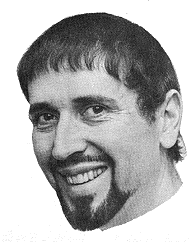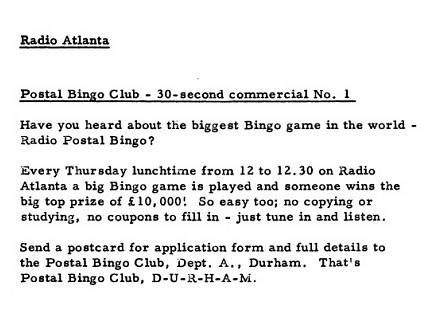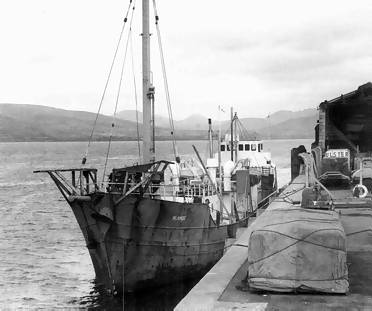Colin Nicol was an early signing to Radio Atlanta and, after a broadcasting career which also included Radios Caroline, England and Luxembourg, the BBC and BFBS, he
returned to his native Australia. He remained fascinated by the history of offshore radio and kindly provided many items of memorabilia to The Pirate Radio Hall of Fame.
Back in the eighties, he interviewed a number of people who had played major roles in the birth of offshore broadcasting. His interview with Allan Crawford, the founder of Radio Atlanta, is here;
with engineer Patrick Starling here; and with music man Ken Evans here. Other interviews have appeared in Offshore Echo's magazine. His conversation with Caroline South's
on-shore contact Bill Scadden can be found on the Offshore Radio Nostalgia website.
This interview with Radio Atlanta's General Manager, Richard Harris, took place on Wednesday 8 February 1984. Sadly since then both Richard and Colin have died. This interview is copyright Colin Nicol.
We are grateful to him for allowing The Pirate Radio Hall of Fame to publish it.
Colin Nicol: Begin at the beginning, Richard.
Richard Harris : The beginning started for me in 1962, I think it was. I was working for ATV (Associated Television) at the time but used to do sessions - recording sessions as a musician, and I
happened to be doing a recording session - I think it was either for Frank Chacksfield or Tony Osborne, one of these stringy things - in studios in Ladbroke Grove playing a double bass, and during a break in the recording
I was talking to one of the technicians and he was on about this guy who'd come in and was going to operate an offshore radio station, off the east coast, so I said well, “Who is he?” “Ooh, he said, I
don't know - he's some music publisher”. So I said, “You don't know his name?” and he said, “No, no, he came in here and he was doing something”. So I then set about trying to find this
mythical character and eventually it led me to the offices of Southern Music in Soho and Allan - Allan Crawford.
CN: Are you sure this was '62, it wouldn't have been as early as '61?
RH: Well, I - I think it was - sixty - may have been '61 - I think it was ..
CN: Think backwards in terms of how long it was before you went on the air ..
RH: It may have been '61 then ..
CN: Well, I don't know, I'm not saying it is. I'm just trying to ..
|

|
|
Mike Raven.
|
RH: I can't honestly remember, er - I can't even remember - yes, it must have been '61, because when I eventually met Allan he said, “How did you find me?” I
said, “With great difficulty” because no one knew his name or anything and I had to literally track him down and so yes, it must have been '61 because it took some time. I met him in 1962. And he said,
“Are you interested in thinking of joining me?” And I said - no he said, “Anyone who is as keen as you are to find me and would like to join, you know, let's do it”. At that time he didn't
have any regular staff as such, I don't think. He introduced me to (investor) Kitty Black and other people who had started in with him, whose names escape me now, except for Churton Fairman (Mike
Raven) whom of course, we both know, and he and I used to have regular evening meetings after we had both finished work, usually in Chinese restaurants, to discuss the setting up of the studio, programme format, how
it was going to be and eventually I sort of became General Manager of Project Atlanta Ltd, which it was called then. He formed a company called Project Atlanta ..
CN: Do you know which date it was he formed that, which year?
RH: I don't know - it was certainly going when I joined him, officially, which was ..
CN: Late '63 ..
RH: Mid '63, I think. Mid '63. Because it was a corporate, he, um - the ship was the Mi Amigo and Project Atlanta Limited was PAL (my friend, pal) and he liked this, he used to keep saying, “I
love it”. He used to keep on about the fact that the Mi Amigo and the PAL was a thing and he liked the name Atlanta and indeed, so did I. And that's how it first started. The time came in mid '63 when eventually I
left ATV and went to work for him full-time.
CN: And who else was involved by that time?
RH: By this time, er - he said to me, “Who are we going to have to broadcast?” and I said, “Well, you're the best ..”, I said to him, “We should have Australians”,
because we didn't want Americans. There were no Brits who were capable of doing this, or at least I didn't think so because it was so new, and let's face it commercial radio in Australia had been around for a long, long
time - he was Australian, and so he virtually said, “I'm glad you said that, because I've got a whole bunch of Australians”, and he mentioned T.W. (Tony Withers / Windsor),
you (Colin Nicol), Ken (Evans - Programme Manager), Dermot, who was in those days an engineer, Dermot Hoy, who eventually became Bryan Vaughan, and that was virtually the nucleus at
that time and I said, “well when are all these characters coming?” He said, “ah well, we've got them all on ice and we'll get together soon” but he said “first thing is, we've gotta get this
studio set up”. So he then took me to Dean Street - what was was the number?
|

|
|
Promotional script for Radio Atlanta bingo, kindly provided by Colin Nicol.
|
CN: Forty-seven.
RH: Forty-seven, yes. Next to a near-beer joint, wasn't it? Or was it a dirty bookshop? And a shop that sold working uniforms, do you remember? Overalls ..
CN: Yes, down below.
RH: Yes, down below, yeah.
CN: Still there, hasn't changed.
RH: (Laughs) He took me up to the top floor where there was this large room with a big black grand piano and he said that this is where we are going to operate from and he said “let's design
the studio”. So I said how I think it should be set up based on the studios that I'd worked with, mainly with Forces Broadcasting, which you probably know, how we needed a place for the presenters and the engineers
outside, how it was all going to be on tape and one thing and another and we enlisted, or we acquired, my namesake a guy called John - John Harris - who along with Dermot did all the electrical wiring and one thing and
another.
CN: Just going back to your connection with BFBS. That was obviously a useful experience you had to draw on, what was your time with BFBS, just describe that, would you?
RH: It was while I was still serving in the forces and I worked in British Forces Network in the Middle East, in Egypt and also in Libya. Whilst we were in Libya I did a lot of work for the American
KDOH Voice of Home which was based on the American Air Base at Wheelus Field in Tripoli, which was the largest American Air Base outside the United States. They used to call me their ‘limey disc-jockey’
and I used to call them ‘my colonial colleagues’ and we got on like a house on fire. That was my experience and it was quite considerable. I'd done quite a lot, and also with the Americans, of course, they
had a television station as well and I used to do television presentations for them as a sort of a gimmick, you know. So when Allan said “well what sort of experience do you have in broadcasting?” I was able
to tell him, well I'd done both British Forces and some amount of American Forces, including television.
CN: So this brings us up to setting up the studios in Dean Street.
RH: Right. As you know, we eventually got the thing set up and then whilst the trauma of getting the ship prepared was going on, we were always working like - getting our presentations right, weren't
we? programmes right and rehearsing, rehearsing, rehearsing and getting hold of music and giving it to poor old Ken who had to put fantastic programmes together out of virtually nothing, of which I think he did a marvellous
job and so it was. Whilst all this was going on, of course, I used to still see a tremendous amount of Allan, probably more than the rest of the guys, 'cos - he had an office below us, didn't he? - and we would hear about
the - what was happening to the Mi Amigo, and of course what happened - and also heard all about Caroline.
CN: When did you first become aware of Radio Caroline starting off on the back of Radio Atlanta, and (Caroline founder) Ronan O'Rahilly's connection?
RH: It must have been, for me, early '63. He (Crawford) told me that the Mi Amigo had crossed the Atlantic, I think, from Galveston, Texas, which I think is where he bought it, and it was having
its mast put on in Ireland and he told me that, when I asked him how did you organise that, he said that well, this guy Ronan O'Rahilly, who I'd never heard of before, had got a father who'd been a great sort of, er,
Irish loyalist who had a bit of Ireland which included a port and he said that we could put the Mi Amigo there and get the mast put on it. I said, “well why can't we put it in an English port?” He said that
as soon as we went in there, they'd slap a writ on the mast and that would be it, we couldn't move it. He said that they were so adamant that it could not be done and they weren't going to allow us to do this, to broadcast
offshore, that they would find anything wrong with the boat just to stop this happening.
CN: And who told him this, do you know - his lawyers, or his friends at Trinity House?
(webmaster's note: a group of Trinity House personnel invested in Project Atlanta.)
RH: I think his friends at Trinity House had made it quite clear that this wasn't going to happen.
CN: So there was the mast being fitted in Greenore ..
|

|
|
The mv Mi Amigo being fitted out in Greenore. Photo copyright The Daily Express, reprinted from ‘Offshore Radio’, published by Iceni Enterprises.
|
RH: That's right, yes. Of course, we all asked him why it couldn't be done in Spain and he said well because, he said he'd been offered this port in Ireland which was so much
nearer and this is where he'd decided to have it done, so - I couldn't understand it, anyway. So that's what happened. And then, of course, he said, “Oh by the way”, he said, “Ronan has bought a ship
and that is also being done”, but he said, “Ours will be ready first, of course, he's not going to, er, he's not going to sort of, do the dirty on us or anything like that”. And I couldn't believe this,
I said, “But, Allan, you're mad - of course he will, he'll get his out first and in the meantime his people are wandering all over the Mi Amigo, they see exactly what equipment is there, exactly what is required
to put an offshore radio station out to sea”, and I said, “He's obviously going to do it and ride on your back to do it”. “Oh, no, no, no”, he said, “He's not”. Of course we both
know this is exactly what happened.
CN: At what stage did you meet Ronan in all this?
RH: When I first joined Allan full-time - mid '63. I used to see quite a lot of him in Allan's office in Dean Street, he was always there, you know, sort of thing - and every time I, or indeed Leslie
Parish, who was in charge of sales, used to ask him ..
CN: From Granada I think, Leslie Parish, wasn't he, Granada Television?
RH: I think it was Granada. But every time we used to ask Allan how it was going on you know, he was saying, “Oh, you know it's happening. Won't be long now”, and so on. And so the rest is
history, as far as that is concerned.
CN: Who else was involved on the Project Atlanta side at that time, do you remember - investors, shareholders, members of the board, did you have dealings with many of them?
RH: No, not especially with them - I did - talking about Trinity House - can you remember the name of that fantastic ..
CN: Sandy Horsley?
RH: Yes, Trinity House pilot, I used to see a lot of him. He was terrific.
CN: Sandy Horsley.
RH: Yeah. There was - I met Kitty (Black), of course. But there were all sorts of odd people, who had invested small amounts in the thing and a lot of them, of course, I never did meet. He (Allan)
then of course, formed another company which employed you, me, T.W. and all the rest of us called Hengown Limited which, if you remember, paid our wages and was the sort of the operating company. It was one of those
companies he bought off the shelf. Why he didn't change the name I'll never know. Hengown is the most dreadful name, but there we are. That really takes us now up to the stage where we had the studios operating, we
had a sales organisation, ie. Lesley Parish, who went rushing around trying to sell air-time, and we had technicians and the staff and the programme people ready to actually launch a broadcast. Do you remember that?
CN: Oh yes. We were ready to go, the ship wasn't.
RH: That's right. Then, as an aside, Allan had an extraordinary thing that we should have huge great information boards, do you remember, up in the studio? An amazing ‘paddy’ carpenter, I
think he was an Irishman, who used to keep coming in, and offering us advice on how to run a radio station (laughs) - he was one of the characters I should never forget. (He made the boards). On the training side, I
do remember - and you'll remember this too - a young guy who came in, just out of the RAF as a corporal, a Canadian who called himself Simon Dee, you remember? And it was us who actually
taught him how to broadcast. We sat him in that cubicle, and Dermot and I and you and all the rest of us used to twiddle the knobs for him outside while he was in there, and teach him exactly how to do it. Tony Withers
gave him a tremendous amount of help. Of course, he was the one who eventually went out and became the first one to broadcast.
CN: On the rival ship.
RH: On the rival ship. We, if you remember, were constantly interviewing and constantly auditioning prospective disc jockeys, I mean, I was doing it all the time, and eventually we ended up with
a team that consisted of me, you, T.W., do you remember a guy called Clive Burrell? Churton Fairman, who was Mike Raven, and who else was there? That was virtually the nucleus of the ..
|


